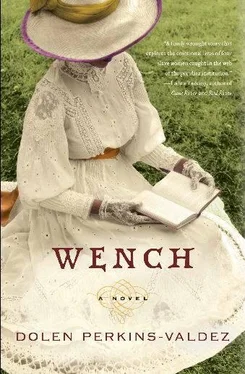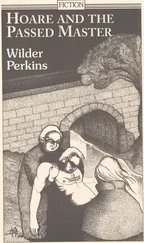“I aims to do just that,” Jeremiah said.
“Y’all hush up,” Old Joe said. “Ain’t nobody marching up to Marsuh house. Bossman’ll be back in no time and won’t nobody have to work under no woman no more.”
Baby rested a hand on his wide thigh. “It ain’t right for no nigger to work under no white man and it sho ain’t right for no man to work under no woman. I say we all sits down in the fields tomorrow and don’t start working till Bossman Roberts come back out here.”
“The man can’t walk,” Young Joe said. “How he gone come back out here?”
“He can pick up a stick and use it, same as everybody. Remember that time I broke my leg?” Jeremiah said. “I was made to hop right back out in that there field, cripple and all. Ain’t nobody care. And I did it, too. Roberts don’t want to work. He just trying to shame us by sending his woman out here.”
The men weighed Jeremiah’s words as he shook his knee. Somebody rang the supper bell in the slave quarters and the men stirred. Young Joe held on to his father. Jeremiah had to hold onto the tree for support as he helped pull Baby to his feet. They walked slowly to the quarters.
By the time the slaves heard about Jeremiah’s visit to the big house, it was dusk. Bellies were as full as they were going to get, and the children had finished the final chores of washing plates and cups. A group of women sat around the workyard mending shirts.
The word passed with the speed of most rumors on a plantation. Jeremiah had gone to the house and their master was coming down to see about Roberts. From the cracks of their cabin doors, women watched the path leading from the Big house. One woman sat her five-year-old out in the yard to keep watch. They figured they would not know the outcome of it all until the next morning when they had to report to the fields again.
As the night grew dark and they sank into the thin soft of their pallets, they slept lightly, anticipating the crowing of the cock so they would know if they would have to work under the white-haired woman again.
In the morning, the slave women rose earlier than usual to begin breakfast. They looked to their tow sacks for the grain they used to round out their meals, but found that the sacks were empty. The women went from cabin to cabin to see if the same was true for everyone. And then the slow realization sank in that the food had been rationed.
Master Drayle had taken their food in order to punish them for complaining about the woman overseer. They were certain of it. When they reported to the fields that morning, there perched the hefty, white-haired white woman high in the tree, the heavy folds of her dress snapping off tips of branches.
“Get to work!” she yelled, fiercer than usual.
The slaves began their toil, their stomachs rumbling with emptiness. No one spoke to Jeremiah, even those who had encouraged him. He was back to his usual silent self. A sack of nuts made its way from slave to slave, and the sound of shells being crunched between teeth rumbled among them. That night, the women barely spoke to their men, blaming the lot of them for the empty sacks hanging slack by their doors.
On Fran’s fortieth birthday that year, the slaves cooked a celebration dinner. Fran’s best childhood friend, Yancy Butterfield, arrived in a sea of green. Taffeta, earrings, necklace, jingling bracelets. Green shoes peeking from beneath her dress. All set against a skin so translucently white that Lizzie had to force herself not to stare. Mr. Butterfield and Drayle retired to the library where they defied Fran’s wishes by having a before-dinner cigar.
The two women settled in the parlor and waited for Lizzie to stoke the fire.
They began their visit by taking turns admiring each other’s jewels. Lizzie couldn’t help but notice that Yancy’s were more exquisite. Fran seemed to note it, too.
“What a lovely dress, Yancy. You outdo me on my own birthday.”
“It’s all in the fabric, dear. That’s why I brought you something special.” She lifted her chin toward Lizzie. “Miss Dessie. Would you mind fetching that box out of my carriage?”
Lizzie forgave Yancy for calling her the wrong name. All because she said “miss.” Because she said “would you mind.”
“Yes, ma’am.”
“Wash up first,” Fran added.
“Yes, ma’am.”
Lizzie knew that the women had grown up together and were closer than Fran was to her own sister, but the two friends seemed different to Lizzie. Whereas Fran was moody and subject to extreme changes in temperament, Yancy exhibited a mild steadiness. There was a genuine pleasantness to her that Lizzie sensed to be more than a public offering, and when Lizzie saw the woman sitting next to her husband in the parlor, she observed a tenderness between them that she had never seen between Drayle and Fran. At one point, the man had even fondled the bracelets on her arm. Lizzie felt that if she lived with the Butterfields, she would not be so guiltless in her betrayal of the mistress. In a way, Fran’s spite made it easier.
Lizzie was transfixed by the Butterfield carriage. She had never seen one so fine. Leaves swirled around it, its dark fabric a stark contrast to the fall foliage. She poked her head inside and inhaled. Lilac sweet, just like Yancy Butterfield. Lizzie climbed into the carriage and closed the door behind her. She shut her eyes and pictured her and Drayle, riding along, his head on her shoulder, her hand on his knee.
She leaned back into the seat and felt a soft package dig into her back. She pulled it from beneath her, hoping it wasn’t ruined. She perched it on her shoulder and went into the house where she carefully deposited it in front of their guest.
“Thank you, dear.”
Yancy placed the package in Fran’s lap. “Why don’t you open your present now? The men don’t have much interest in these things, and I can hardly wait.”
“Why not?” said Fran. She tore back the paper.
“I hope you like it.”
Lizzie took her time exiting the room.
“Oh my. Ohhhh my.” Fran pulled out yards and yards of blue fabric, the same fabric as Yancy’s green.
“This is why I wore this dress. I wanted you to see how beautiful it looked all put together.”
“I love it, Yancy. I just love it.” Fran disappeared with the fabric trailing behind her. “This must have cost you a fortune,” she called from in front of the hall mirror.
“If you need me to, I can get my seamstress to make the dress for you,” Yancy said. “You don’t want slaves fooling with this fabric.”
“A slave? With my fabric down in that old nasty workyard? I wouldn’t dream of having a slave touch this!” Fran came back into the room, her hand on her cheek as if the very thought made her flushed. “And I don’t need your seamstress. What would I need your seamstress for? I have my own.”
Dessie brought in cold drinks on a wooden tray and placed them on the table beside the women. Fran watched Dessie closely as she took the blue fabric and folded it into a neat square before placing it on the settee.
“Y’all be needing something else ’fore dinner, Missus?”
“No, Dessie. That’ll be all.”
Lizzie and Dessie nodded at the women before they went back to the kitchen.
Lizzie’s children sat at the table slurping milk, white mustaches above their lips. Nate was big for his age-only five and already taller than other boys his age. His legs bumped against the chair beneath him. Although Rabbit was just a year younger, she was smaller. She held the cup in her pale hands and smiled at her mother.
“Who gave y’all milk?”
“Master Drayle,” Nate said. He had learned recently that Drayle was his father, but was still unsure what this meant. He called Drayle by the name everyone else did-Master-and he had not connected that Drayle was his “pa” as some of the other slave children called their fathers or called men who were like fathers to them.
Читать дальше












